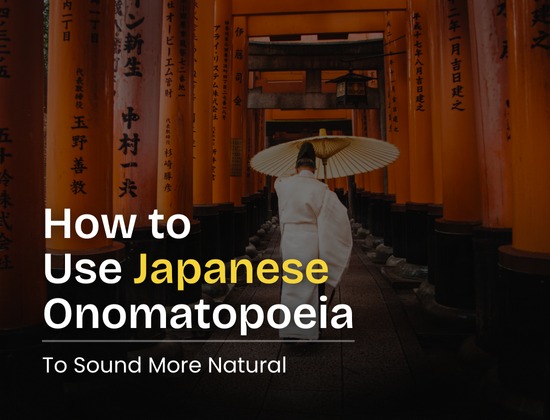
How to Use Japanese Onomatopoeia to Sound More Natural
.
When learning Japanese, mastering grammar and vocabulary is important but if you want to sound truly natural and native-like, there's one secret weapon: Japanese onomatopoeia. Known as “giseigo” and “gitaigo”, these sound-symbolic words are used every day in conversations, anime, manga, and even business settings. Whether you're studying or planning a trip to Japan, understanding onomatopoeia will give your spoken Japanese the native edge.
What Is Japanese Onomatopoeia?
In English, onomatopoeia is limited to words that imitate sounds like "buzz" or "bang". But in Japanese, it’s more diverse and deeply woven into everyday language.
There are few categories, they are:
-
Giseigo (擬声語): Words that mimic actual sounds (e.g., animal noises).
-
Gitaigo (擬態語): Words that describe feelings, movements, or states without real sounds.
Why You Should Learn Japanese Onomatopoeia
-
Natural-Sounding Japanese - You’ll sound more fluent and expressive just like native speakers.
-
Deeper Cultural Understanding - Many onomatopoeic words reflect how Japanese people experience the world.
-
Boost Listening Comprehension - Anime, drama, and daily conversations are filled with them, learn them and never miss the nuance!
Common Japanese Onomatopoeia to Start Using Today
Here are a few must-know examples to upgrade your speaking game:
1. ワクワク (wakuwaku) – Excited, thrilled
Use: 明日の旅行がワクワクする!(I'm excited about tomorrow’s trip!)
2. ドキドキ (dokidoki) – Heart beating fast, nervous
Use: 面接の前はドキドキした。(I was nervous before the interview.)
3. ぐっすり (gussuri) – Sound asleep
Use: 昨日はぐっすり眠れた。(I slept soundly last night.)
4. ぺらぺら (perapera) – Fluent
Use: 彼は日本語がぺらぺらだ。(He’s fluent in Japanese.)
5. ピカピカ (pikapika) – Sparkling/clean/shiny
Use: 新しい靴はピカピカだ!(My new shoes are shiny!)
How to Practice Japanese Onomatopoeia
-
Use Them in Everyday Conversation - Try replacing plain words with onomatopoeia in your speech.
Instead of saying “very clean” say ピカピカ (pikapika) - Sparkling/clean/shiny -
Watch Anime with Subtitles - Shows like Doraemon, My Hero Academia, or Shirokuma Cafe are packed with onomatopoeia.
-
Write Your Own Sentences - Create flashcards or write a mini journal using 3 new onomatopoeic words daily.
At The Language Skool (TLS), our JLPT-focused Japanese courses are designed to make your speaking, listening, and comprehension practical and fluent including real-life expressions like onomatopoeia.
Join TLS and start speaking Japanese like a pro! Enroll now at www.thelanguageskool.com











